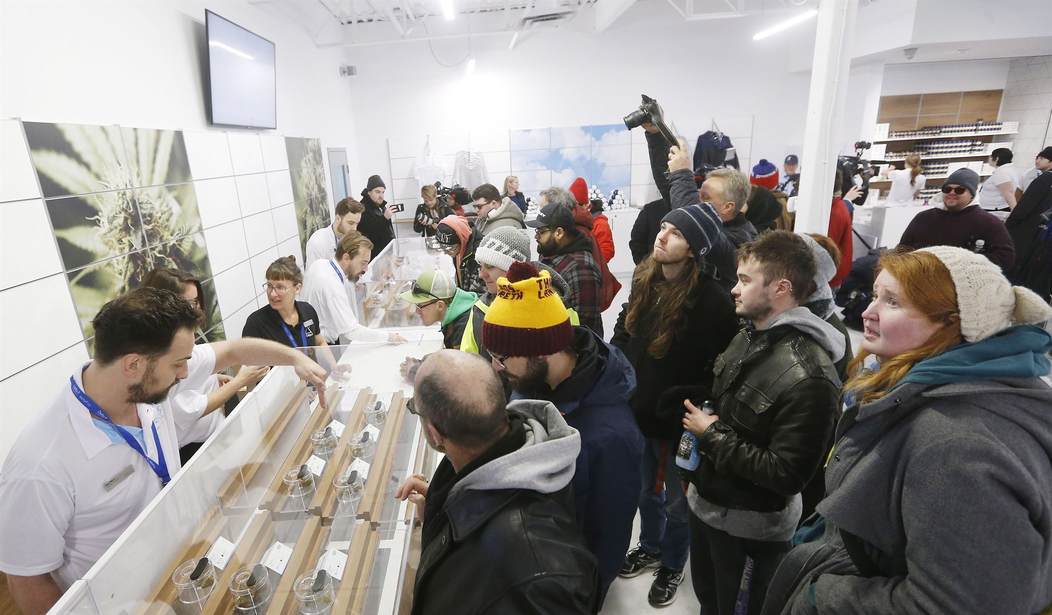There are now 24 states, plus the District of Columbia, that have legalized recreational marijuana. This change in attitude toward the drug was originally driven by a push to make it legal for medicinal purposes, i.e. for cancer patients and other people struggling with nausea. But over time this morphed into the kind of broader legalization we have today.
But as many have noted, the drug being sold today is not like the stuff some were smoking in the 1970s or 1980s. Today's cannabis products are often many times more potent and along with that has come a host of problems that are only starting to be recognized by many doctors, everything from addiction to psychosis. As with any drug, the people who use it most frequently are the ones most likely to experience problems.
About 18 million people — nearly a third of all users ages 18 and up — have reported symptoms of cannabis use disorder, according to estimates from a unique data analysis conducted for The Times by a Columbia University epidemiologist. That would mean they continue to use the drug despite significant negative effects on their lives. Of those, about three million people are considered addicted.
...More than 4.5 million use the drug daily or near daily, according to the estimates, and 81 percent of those users meet the criteria for the disorder.
“That means almost everybody that uses it every day is reporting problems with it,” said Dr. Wilson Compton, deputy director of the National Institute on Drug Abuse, who was not involved in the analysis. “That is a very clear warning sign.”
In the worst cases, heavy users experience exactly the kind of symptoms that cannabis is generally thought to alleviate, i.e. nausea, vomiting and pain. This is known as cannabinoid hyperemesis syndrome and it can even lead to death in extreme cases.
A telltale sign of cannabinoid hyperemesis syndrome is that heat often temporarily relieves the nausea and vomiting. Hundreds of people recounted to The Times, in interviews and survey responses, that they had spent hour after hour in hot baths and showers. Some were burned by scalding water. One teenager was injured when, in desperation, he pressed his body against a hot car...
Among the fatalities identified by The Times was Kevin Doohan, a 37-year-old electrician in California with a fiancée and a young daughter. He died in 2020 after living with C.H.S. for a decade.
He had stopped going to hospitals when symptoms hit because he didn’t want to be far from hot baths, according to his mother, Kim Holdredge. But during that last cycle of illness, bathing and passing out, he never woke up.
Those cases are rare but it's estimated that as many as 6 million Americans, about a third of daily users, have cannabinoid hyperemesis syndrome. There is also mounting evidence that the drug is connected to episodes of psychosis and may even be a factor in rising cases of schizophrenia.
“Not everyone who smokes cigarettes develops lung cancer, and not everyone who has lung cancer smoked cigarettes,” said Dr. Deepak Cyril D’Souza, a professor at Yale School of Medicine and a staff psychiatrist at VA Connecticut Healthcare Systems. “But we now know, after denying it for many, many decades, that the association between the two is very important. The same is true for cannabis and psychosis.”...
A study in 11 sites across Europe found that people who regularly consumed marijuana with at least 10 percent THC were nearly five times as likely to develop a psychotic disorder as those who never used it. A study in Ontario found that the risk of developing one was 11 times as high for teenage users compared with nonusers.
Personally, I've never wanted to use drugs or be around people who do. I saw plenty of it in my high school and college years and all of those experiences convinced me it just made people dumber, momentarily at first but over time the effect seemed to accumulate. In my experience, weed never seemed as dangerous or addictive as alcohol or harder drugs, but then again the stuff people are taking these days is worlds apart from what I was around in the 1980s.
The marijuana smoked in the 1990s, typically containing about 5 percent THC, was transformed. Companies turned out inconspicuous vape pens, fast-acting edibles, pre-rolled joints infused with potency enhancers and concentrates with as much as 99 percent THC.
Weed is not always harmless and it can be addictive. It's probably especially bad for younger people whose brains are still maturing. Does that mean it should be illegal? Not necessarily. Alcohol kills a lot of people every year but prohibition didn't work. Nevertheless, anyone who is using potent cannabis everyday is setting themselves up for problems. Hacking your own chemistry to feel good is always subject to a law of diminishing returns. Sorry if I sound like a 1980s after-school special but I've been pretty consistent on this since I was 16 myself. Don't do drugs, kids.









Join the conversation as a VIP Member